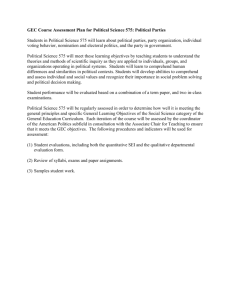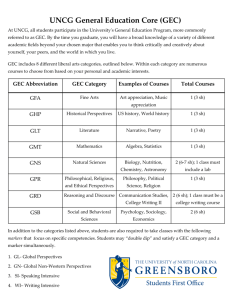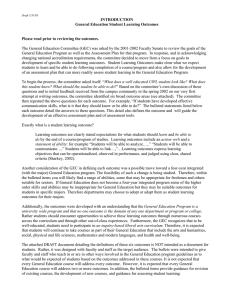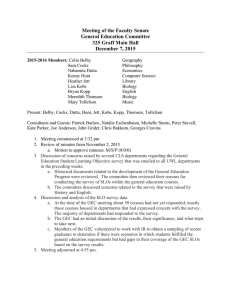General Education Committee Annual Report, 2009-2010
advertisement
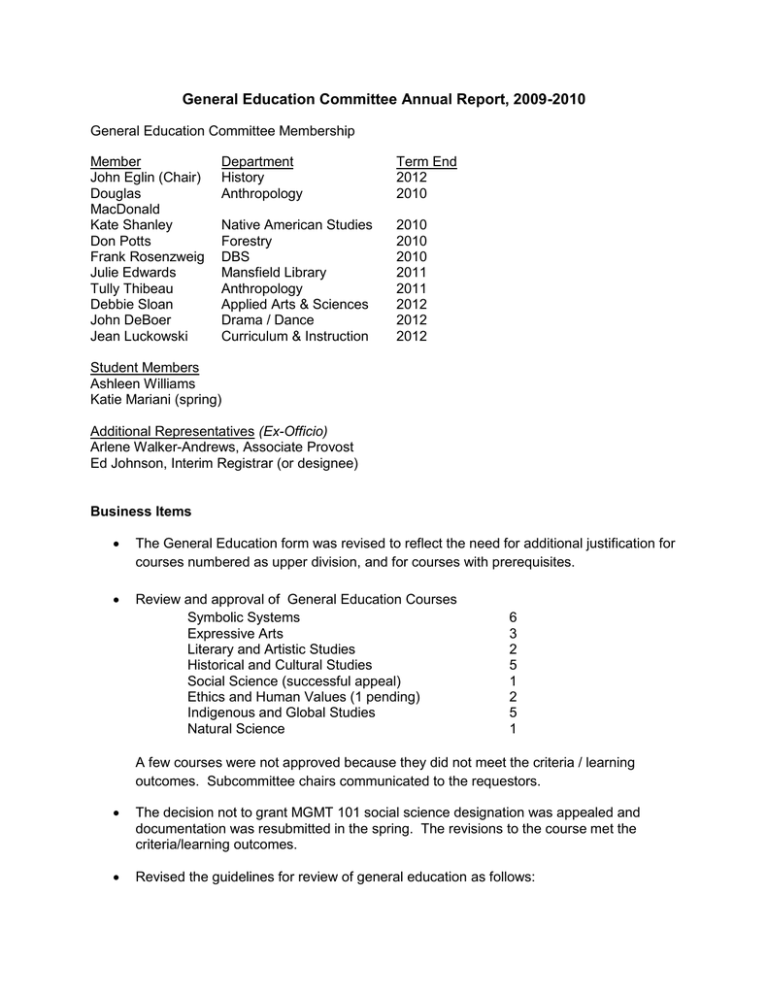
General Education Committee Annual Report, 2009-2010 General Education Committee Membership Member John Eglin (Chair) Douglas MacDonald Kate Shanley Don Potts Frank Rosenzweig Julie Edwards Tully Thibeau Debbie Sloan John DeBoer Jean Luckowski Department History Anthropology Term End 2012 2010 Native American Studies Forestry DBS Mansfield Library Anthropology Applied Arts & Sciences Drama / Dance Curriculum & Instruction 2010 2010 2010 2011 2011 2012 2012 2012 Student Members Ashleen Williams Katie Mariani (spring) Additional Representatives (Ex-Officio) Arlene Walker-Andrews, Associate Provost Ed Johnson, Interim Registrar (or designee) Business Items The General Education form was revised to reflect the need for additional justification for courses numbered as upper division, and for courses with prerequisites. Review and approval of General Education Courses Symbolic Systems Expressive Arts Literary and Artistic Studies Historical and Cultural Studies Social Science (successful appeal) Ethics and Human Values (1 pending) Indigenous and Global Studies Natural Science 6 3 2 5 1 2 5 1 A few courses were not approved because they did not meet the criteria / learning outcomes. Subcommittee chairs communicated to the requestors. The decision not to grant MGMT 101 social science designation was appealed and documentation was resubmitted in the spring. The revisions to the course met the criteria/learning outcomes. Revised the guidelines for review of general education as follows: General Education Courses, Guidelines for Review of (Approved 1984; Revised 10/18/87, 9/30/03, 10/20/09) General Education Subcommittees are charged with the following responsibilities: 1. Review all general education courses every four years to determine if they still meet and conform to the criteria and learning goals (three groups per year). Each course should be considered as if it were being proposed for the first time. 2. At the beginning of the year the General Education Committee (GEC) will determine which groups to be reviewed and establish the appropriate subcommittees and timelines. Normally subcommittees shall be chaired by a member of the GEC with members from the appropriate disciplines. Subcommittees shall consist of 3-5 members. 3. The GEC Chair will provide each unit the list of courses to be reviewed in that unit. Each unit is responsible for retaining or withdrawing the general education status of its course(s) by the stated deadline. 4. The Registrar will provide a list of dormant courses. Any course not offered within the last three years may be stricken from the list in consultation with the Registrar's Office and the offering department. Ordinarily, a course for general education ought to be offered at least twice in four years. 5. Most courses can be reviewed adequately from the general education form and syllabus, but in some cases, a subcommittee may wish to ask for additional materials. The subcommittee should note any inconsistencies between the course and the criteria/learning goals. The subcommittee will communicate any necessary adjustments to the instructor. The instructor and/or chair have the options of requesting reconsideration by the GEC or of modifying the course to fit the current criteria/learning goals. 6. The subcommittee should determine whether the criteria/learning goals themselves may require review and communicate any recommendations to the GEC. The GEC spent several weeks in spring term considering the issue of the symbolic systems requirement, as charged by the Faculty Senate. It discussed the criteria and mechanism for programs to apply for exceptions to the Modern and Classical Languages. This discussion is ongoing, as more information is needed concerning the capacity of MCLL and other language courses to serve the needs of additional students with existing resources. In connection with this discussion, the GEC met with Linda Gillison Chair of Modern and Classical Languages and literature. She explained the logistics of students fulfilling the Modern and Classical Language requirement. Not all students need to take the first year (101 and 102) language courses. The requirement is to demonstrate proficiency at the 102 level. Students can take the placement exam (offered for French, German and Spanish). If they place in the 201 level, then they have satisfied the requirement. Students can also self place after consultation with a faculty member. Student can also satisfy the requirement by proving proficiency from taking languages from other universities. The requirement can also be satisfied with advanced placement (AP) or International Baccalaureate (IB) credit. MCLL strongly believes that UM should have a commitment to teaching languages given its global mission. [Chair's comment: I strongly concur. UM has been trying for at least the last fifteen years to institute a chapter of Phi Beta Kappa on campus; currently, we are one of only three public flagships that lacks a chapter of the nation's oldest and most prestigious academic honor society (founded in the 18th century at William and Mary by Thomas Jefferson and others). UM's lack of a meaningful foreign language requirement for its students has been a major obstacle to this outcome.] The GEC also discussed American Sign Language courses in its deliberations over this issue. It is unclear whether American Sign Language would meet the criteria for the modern and classical language requirement. The study of culture and literature is included in language study. An argument could be made that it should be included. It would be helpful to know whether other universities accept American Sign Language as fulfilling a language requirement. In the previous general education program American Sign Language could be taken as a symbolic systems sequence. It was not submitted for review during the transition and is not required by a program so would not be eligible. The GEC considered the one-time only general education designation for experimental courses policy at ASCRC’s request. It determined that there are circumstances when experimental courses are appropriate for general education. The committee decided to retain the policy and clarified that “one-time-only” refers to single semester approval. The Committee was asked to provide input regarding updates to UM general education courses that satisfy the MUS core from Professor Samson, UM’s representative on the Board of Regents General Education Council. The Council approves the general education courses from each campus that satisfy the MUS Core. Pending The GEC is compiling a file of successful general education proposals that illustrate best practices in the submission of courses for review. Communication Items A memorandum from Cathy Corr of the Applied Arts and Sciences department of the COT asserts that Board of Regents Policy 301.12 exempts students with an Associate of Arts degree from the foreign language requirement. [Chair's comment: These students may still need to complete the language requirement if they enroll in a major that requires it.]
